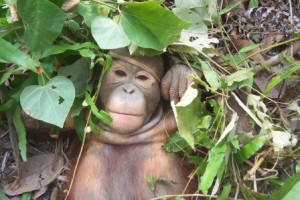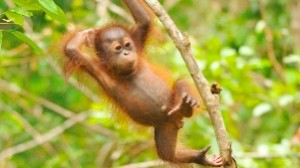Indonesia Forestry Ministry issues decree allowing orangutan release in restored timber concession forest Press Release by BOS Germany, translation and editing by Lars Dittmer
Bogor, Indonesia, 20 Aug 2010: The Borneo Orangutan Survival Foundation (BOSF) announced today that it would, for the first time in 9 years, release a rehabilitated captive orangutan back into the wild. The long-awaited release was finally facilitated by the issuance of a special Ministerial Decree by the Indonesian Forestry Minister dated August 18, 2010, which will allow the release of the orangutan into a former timber concession restored into natural forest by PT Orangutan Habitat Restoration Indonesia. The restored forest is located in the East Kutai district of East Kalimantan, Indonesia.
PT Orangutan Habitat Restoration is a forest rehabilitation company established by BOSF for the purpose of creating a suitable area to release rehabilitated orangutans currently living in BOSF rehabilitation centers in Kalimantan.
The release is the first step toward the release of all captive orangutans in Indonesia by 2015 as directed in December 2007 by the Indonesian government at Nusa Dua Bali. For the past 8 years BOSF has been unable to release rehabilitated orangutans back to the wild due to a lack of suitable habitat for the releases. The Forestry Ministry Decree has now, for the first time, opened the door for BOSF to begin releasing the formerly captive orangutans it has rehabilitated for survival in the wild.
The release area was selected because of its conditions are near perfect for the survival process for newly released orangutans. It is an 86,450 hectare site in which there is a low density of wild orangutans living in that forest area. Generally, around 30,000 hectares are required to support 250 orangutans. The topographical conditions in the restored forest area are near perfect, with an altitude of 750 meters above sea level and well-stocked with tree species which provide shelter and food for wild orangutans. It is also safe from human threats as the local inhabitants are highly supportive of the release program.
At the present time, BOSF has some 838 orangutans in its rehabilitation centers, with 612 in the Central Kalimantan Reintroduction Center in Nyaru Menteng and another 226 in the East Kalimantan Reintroduction Center in Samboja Lestari.
The historical release process began during a courtesy call by the Board of Trustees and Board of Directors in April of this year to then forestry minister Zulkifli Hasan, who voiced his full support for the BOSF release program. The August 18 Ministerial Decree is a direct outcome of that visit.
“Now we can begin to concentrate on the next step, the preparation of new habitats,” said BOSF CEO Togu Manurung. “There is still much that we have to do,” he added, “but at least this is a good start for all of us”, he concluded.
Manurung further said that the issuance of the decree was did a great service to the BOSF as it will allow the organization to begin to realize its goals. The first priority, he said , was the release of Bornean Orangutans into their natural habitat with the help of local populations.
“The government has now started the process of issuing permits for us to take control of suitable land for orangutan release,” said the BOSF Chairman of the Board of Trustees, Professor Bungaran Saragih, a former Minister of Forestry. “We must release all captive orangutans back into the wild. They have for too long been living in cages,” said Professor Saragih.
Pressemitteilung von BOS Deutschland: Endlich frei!
Nach 9 Jahren wildert die BOS Foundation den ersten rehabilitierten Orang-Utan im Regenwald Borneos aus: ein Dekret des indonesischen Forstministeriums macht den Weg frei für eine Auswilderung in einem wiederhergestellten Regenwaldstück, das früher Konzessionsgebiet eines Holzkonzerns war.
Bogor, Indonesien, 20. August 2010: Die Borneo Orangutan Survival Foundation (BOSF) hat angekündigt, dass sie zum ersten Mal seit 9 Jahren einen rehabilitierten Orang-Utan auswildern wird. Die lange erwartete Freilassung wurde ermöglicht durch ein Dekret des Forstministeriums vom 18. August 2010, das als Zielgebiet ein wiederhergestelltes Regenwaldstück in Ost-Kutai, Ostkalimantan definiert. Bei dem Areal handelt es sich um das ehemalige Operationsgebiet eines Holzkonzerns, das von der BOS-eigenen Firma PT Orangutan Habitat Restoration (PT RHOI) in naturnahen Regenwald umgewandelt worden war.
„Die Regierung hat nun begonnen, uns Genehmigungen zu übertragen, die Kontrolle über geeignete Auswilderungsareale zu übernehmen“, sagte Professor Bungaran Saragih, Aufsichtsratvorsitzender der BOS Foundation und früherer indonesischer Forstminister. Das Auswilderungsgebiet weist nahezu perfekte Bedingungen für die Tiere auf. Es umfasst 86.450 Hektar, in denen nur wenige wildlebende Orang-Utans heimisch sind. Eine Population von 250 Orang-Utans benötigt ein Habitat von etwa 30.000 Hektar. Die topographischen Bedingungen in dem Gebiet sind exzellent; es liegt etwa 750 Meter über dem Meeresspiegel und verfügt über zahlreiche Baumarten, die Unterschlupf und Nahrung bieten. Eine Gefährdung durch Menschen besteht nicht – die heimische Bevölkerung zeigt große Sympathien für das Projekt und hat Unterstützung signalisiert.
Den Anstoß zu diesem historischen Prozess gab ein Besuch des Aufsichtsrats und der Geschäftsführung der BOS Foundation im April diesen Jahres bei Forstminister Zulkifli Hasan. Der Minister sicherte zu, das Auswilderungsprogramm der BOS Foundation zu unterstützen. Das Dekret vom 18. August ist ein direktes Resultat dieses Treffens. „Der Beschluss des Ministeriums ist eine große Hilfe für die Arbeit der BOS Foundation“, so Togu Manurung, der Vorsitzende der BOS Foundation. „Wir können endlich unsere Ziele in Angriff nehmen. Das wichtigste davon ist, die Orang-Utan-Population Borneos in ihren angestammten Lebensraum auszuwildern – mit Hilfe der lokalen Bevölkerung.“
PT RHOI ist ein Unternehmen, das Wälder regeneriert. Es wurde von der BOS Foundation geschaffen, um geeignete Gebiete zur Auswilderung jener Orang-Utans zu schaffen, die sich derzeit in der Obhut von BOS befinden. Von den 838 Orang-Utans in ihrem Rehabilitationsprogramm leben etwa 612 in der Rehabilitationsstation Nyaru Menteng in Zentralkalimantan und 226 in Samboja Lestari in Ostkalimantan.
Die indonesische Regierung hat 2007 auf Nusa Dua, Bali, angekündigt, dass bis 2015 alle Orang-Utans, die sich momentan in Rehabilitationsstationen befinden, wieder im Regenwald leben sollen. In den vergangenen 8 Jahren konnte die BOS Foundation keine rehabilitierten Orang-Utans auswildern, weil die geeigneten Gebiete dazu nicht vorhanden waren. Mit dem Ministerialdekret hat Indonesien der BOS Foundation nun den Weg geebnet, die rehabilitierten Tiere in die Wildnis zu entlassen.
„Wir werden uns nun auf den nächsten Schritt konzentrieren, nämlich neue Habitate zu gewinnen“, sagte Manurung. „Es gibt immer noch viel zu tun, aber dies ist zumindest ein guter Start für uns.“


